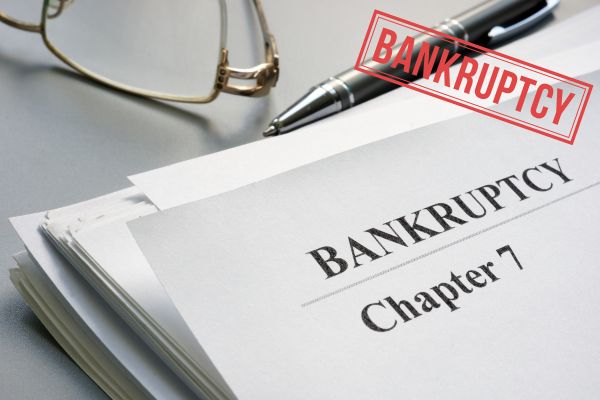Can Anyone File Chapter 7 Bankruptcy?
Filing for Chapter 7 bankruptcy is a powerful way to eliminate or “discharge” most types of consumer debt—such as credit card balances, personal loans, and medical bills—and get a fresh financial start.
But contrary to popular belief, not everyone automatically qualifies. In this post, we’ll walk you through the basic requirements for filing Chapter 7, common reasons people are denied, and what steps you should take if you’re thinking about filing.
1. Who Can File Chapter 7 Bankruptcy?
To file for Chapter 7 bankruptcy in the United States, you must meet certain eligibility requirements set out in the Bankruptcy Code. These can include:
Residency Requirements
- You must reside (or have a domicile, place of business, or property) in the United States.
- Your bankruptcy petition must be filed in the judicial district where you have lived for at least the past 91 days (3 months).
Completed Credit Counseling
Prior to filing, you are required to complete a government-approved credit counseling course. The purpose is to help you understand all your options and ensure you’re filing bankruptcy for the right reasons. You must provide a certificate of completion from the agency when you file your petition.
The Means Test

One of the most critical parts of Chapter 7 eligibility is the “means test.” This test compares your household income to the median income for a household of your size in Michigan.
- If your income is below the state median, you typically qualify for Chapter 7.
- If your income is above the state median, you may still qualify—but you’ll need to fill out additional paperwork to see if your disposable income (after certain allowed expenses) is low enough to pass. If it is not, you may be steered toward Chapter 13 instead.
2. Who Might Be Denied Chapter 7?
Even if you meet all the above requirements, there are situations in which the court might dismiss or deny a Chapter 7 filing:
Previous Bankruptcy Discharge
If you have received a Chapter 7 discharge in the last eight years (or a Chapter 13 discharge in the last six years), you are not eligible to file for Chapter 7 again during that time frame.
Fraud or Abuse
The bankruptcy court can dismiss your case if it finds evidence of fraud or abuse. This might include transferring assets to friends or family members before filing, lying under oath, or manipulating your financial situation to conceal income or assets.
Failure to Complete Mandatory Steps
If you don’t complete the required credit counseling before filing or the debtor education course after filing, your case can be dismissed or your discharge can be denied.
3. Life After Chapter 7
If you do qualify for Chapter 7 and successfully complete the process, the majority of your unsecured debts (e.g., credit cards, medical bills, personal loans) will be wiped out. However, keep in mind:
Some debts are not dischargeable in bankruptcy, including most student loans, recent tax debts, child support, and alimony.
You might lose certain non-exempt assets in a Chapter 7 case. Although many people keep their homes and cars if they are current on their payments and their equity is within the exemption limits, you should review your state’s specific exemptions with your attorney.
A Chapter 7 filing will typically remain on your credit report for 10 years, which may affect your ability to borrow in the future. However, rebuilding credit is possible, and many people find they can access new credit opportunities just a few years post-discharge.
4. Is Chapter 7 Right For You?
If you’re weighed down by debt, a Chapter 7 bankruptcy might be a good solution, but it’s not a one-size-fits-all fix. Here are some guidelines to help you decide:
- Analyze Your Debt Type: If most of your debt is unsecured (e.g., credit cards, personal loans, medical bills), Chapter 7 might give you the relief you need.
- Consider Your Assets: If you have significant property that exceeds exemption limits, be aware it could be sold in Chapter 7 to satisfy your creditors.
- Compare with Chapter 13: If you have a steady income or you don’t pass the means test for Chapter 7, Chapter 13 might be a better route. Chapter 13 sets up a payment plan over three to five years to repay a portion of your debts.
- Consult an Experienced Attorney: Bankruptcy law is complex, and every situation is unique. An attorney will help you navigate the court system, determine if you’re eligible, and guide you through each step of the filing process.
Can anyone file Chapter 7 bankruptcy? Not automatically. You must meet the residency requirements, complete the required counseling, and satisfy the means test—or show that despite higher-than-median income, you still have limited disposable income. Even then, previous bankruptcies, fraud, or failure to follow the rules can stand in your way.
That said, if you do qualify and you’re drowning in unsecured debt, Chapter 7 can be an effective tool for obtaining a fresh financial start. It’s wise to consult with a reputable bankruptcy attorney who can offer personalized advice and help you determine whether Chapter 7 truly meets your needs.
Call An Experienced Chapter 7 Bankruptcy Lawyer Today
Recent Posts
- What Happens If You Don’t Pay Child Support?
- What Disqualifies You From Filing Bankruptcy?
- Who Pays Child Support If Grandparents Have Custody?
- Gray Divorce In Michigan: What You Need To Know
- Can You Get A Passport If You Owe Child Support?
- Chapter 7 Bankruptcy Income Guidelines
- Does It Matter Who Files For Divorce First?
- How Long Does Spousal Support Last
- Why Is January Known As Divorce Month?
- Can A Non-Custodial Parent Claim Their Child On A Tax Return?
